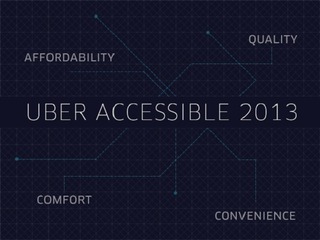Peter Thiel: 'Almost everybody (tech CEO) I know' shifted right
At Culture, Religion & Tech, take II in Miami on October 29, 2024
Read more...
Uber and Washington D.C. have a checkered history, at best, with the company repeatedly bumping heads with the local government as it tries to expand its different services. Lately, though, it seemed that things had calmed down, and that D.C. had finally accepted Uber's presence.
Unfortunately, that peace did not last long, as the DC Taxicab Commission (DCTC) approved a plan on Monday that, according to Uber, will disallow uberX, its line of fuel-efficient vehicles, from operating in the city less than two weeks after it debuted there.
The new regulations define what counts as a sedan vehicle based on EPA standards, such as “Luxury Sedan,” “Upscale Sedan,” and “Sport Utility Vehicle.”
"While originally using criteria such as engine size, curb weight, and luxury features – criteria questioned by commenters – the vehicle definitions are now based on industry-accepted classifications from EPA, a widely recognized source for this type of information," the commission said in its findings.
These new regulations, Uber wrote in a blog post, "outlaw the use of mid-sized, fuel efficient vehicles from uberX."
"During today’s hearing, Commission Chairman Ron Linton argued that allowing consumers to use Uber to arrange transportation using more affordable, more efficient vehicles like a Toyota Camry Hybrid would represent unfair competition to traditional taxi service. He calls it unfair competition; we call it cheaper and better rides for the people who live, work, and play in and around DC," wrote Rachel Holt, General Manager, Washington, D.C. at Uber, said.
"While we’re still figuring out how to operate within this regulatory environment, rest assured that we do not plan to take this lying down. We remain committed to doing everything we can to ensure that everyone in the District can enjoy affordable and efficient transportation options."
The DCTC directly responded to Uber's accusations in its findings, saying that they were simply untrue and that the new regulations allowed for a number of hybrid cars to operate as sedans.
"First, despite the expansive definitions, which were substantially modified in response to prior comments, both Veolia and Uber complain that the rule would improperly exclude energy efficient vehicles, and both suggest that compact vehicles like the Toyota Prius should be included. We strongly disagree," said the commission.
The DCTC noted that its new definition of what a sedan is "would include more than 40 hybrids and alternative fuel vehicles." While it is true that the Prius and "other basic, economy cars" would not qualify, it admitted, "it is also patently untrue that no hybrids could be operated as sedans under the new rules."
"Thus, the definitions, as written, directly serve the need to conserve fuel and protect the environment, without compromising other important interests at stake in the definitions."
UBERx, which first launched in July 2012, is a fleet made of mostly hybrids, as well as some smaller sedans. It is a lower cost option to Uber's standard Black service.
The company recently cut prices on uberX, in order to make them 10% cheaper than a taxi.
Things between Uber and Washington D.C. seemed to have calmed down after a city council unanimously voted to allow a new line of transportation apps that would let users hail rides from their mobile phones last year.
In January, Uber expanded its UberTAXI service to Washington D.C., meaning that people who use Uber were able to choose from either one of the service's standard black sedans or choose a D.C. cab at the normal, and cheaper, rate.
(Image source: https://www.uber.com)
At Culture, Religion & Tech, take II in Miami on October 29, 2024
Read more...The company will use the funding to broaden the scope of its AI, including new administrative tasks
Read more...The company will be deploying Qventus’ Perioperative Solution to optimize its robotics program
Read more...